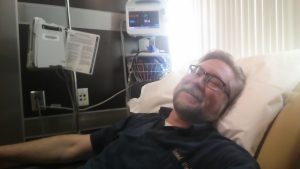
Yesterday was Easter. Today I am in the chair at the infusion center, watching a steady drip work its way into my arm. At some point over the next few days I will likely be scheduling an “exit interview” with a friend who is going to die from his cancer within the coming weeks. There is an interesting, perhaps timely mix of metaphor in all this. The holiday, for those who celebrate its religious significance, is about spiritual rebirth (and literal rebirth for the more fundamentalist among us). I look at these chemicals entering my bloodstream right now as agents of my own rebirth, my second chance at life for as long as it may last, a chance to try and get some things right while I am here. And my friend’s impending death is a reminder that, even with the best of science and consistent faith, these days do come to an end for us all, whether we are ready or not.
Michael March as been, as far as I can tell, a solid Christian and a man of reason. He chose to evaluate all available treatment options, pursuing even the difficult ones when they offered a clear explanation of potential outcomes backed by decades of studies and documented successes. For eight years, he has dealt with various cancers, outliving each prognosis because of committing to his treatments. But at each stage, from diagnosis to remission to reoccurrence, he has been forced to examine his own mortality and come to peace with the idea that he may not see another birthday or Christmas or, as is now the case, another Easter. This was his final celebration of his faith’s Resurrection Story. For Michael, there is a definite end to this existence as we know it, and he is facing it with the determination of ensuring a positive legacy. Continue reading Death, Rebirth, Living On



